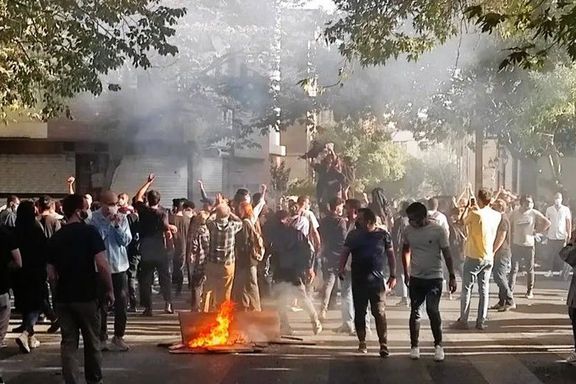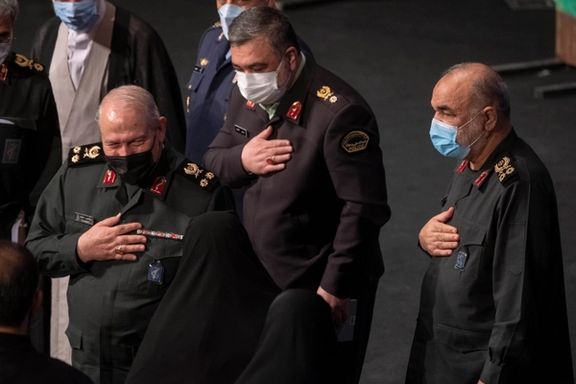Europe Still Discussing Sanctions On Iran’s Guards

With European Union foreign ministers meeting January 23 to discuss new Iran sanctions, some politicians and media want the Revolutionary Guards classified.
The push is mainly because of IRGC's role in using violence and lethal force to suppress protesters since September. Security forces mostly under its command have killed around 500 people during demonstrations and after arrest.
Anne-Claire Lengendre, the French Foreign Ministry spokesperson, said Tuesday that Paris was “working with its European partners on new sanctions measures, without excluding any.”
"Listing the Revolutionary Guard as a terrorist organization is politically important and makes sense," she said on Twitter, adding that legal hurdles still needed to cleared before it could be done.
But while France has been skeptical over the benefits of sanctioning a large part of a sovereign state’s armed forces, Germany’s Foreign Minister Annalena Baerbock tweeted Monday that “listing the Revolutionary Guard as a terrorist organization is politically important and makes sense.” Baerbock added that legal issues were being explored.
It has been widely reported that the United Kingdom is preparing to list the Revolutionary Guards (IRGC), with Foreign Secretary James Cleverly saying on at least two occasions that it had already sanctioned the corps “in its entirety.”

‘Acts of terror’
Designating the IRGC would mean any member’s assets could be seized, and that belonging to the group, attending its meetings, or even displaying its logo would be a criminal act. The EU and UK have both since October sanctioned individual IRGC commanders.
Iran’s Foreign Ministry Spokesman Nasser Kanaani said Monday that those accusing the IRGC of ‘terrorism’ had themselves “committed acts of terror and are accused of sponsoring it.” The spokesman cited the US drone strike in 2020 that killed IRGC general Qassem Soleimani, which the United Nations special rapporteur judged ‘unlawful killing.’
Soleimani was in charge of organizing militant groups in the region that attacked US and allied targets.
The United States designated the IRGC in 2019 as part of ‘maximum pressure’ sanctions against Iran launched as Washington withdrew from the 2015 Iran nuclear agreement, the JCPOA (Joint Comprehensive Plan of Action).
During great power talks in Vienna, which paused late summer, aimed at restoring the JCPOA, it was reported that Iran wanted the IRGC, or at least its construction and business operations, delisted. The US reportedly refused.
‘Maximum pressure’ was designed, according to Mike Pompeo, Secretary of State 2018-21, to force Iran to concede 12 demands including ending all uranium enrichment, scrapping missile defense, and breaking links with regional allies. The EU describes the aim of its sanctions more vaguely as a “change in policy or conduct.”
‘Reinforce the message’
In the right-wing Daily Telegraph January 5, veteran columnist Con Coughlan wrote that listing the IRGC would “help to reinforce the message to Iran that the West is no longer prepared to turn a blind eye to its nefarious activities.”
Supporters of listing have compared the IRGC, which includes many thousands of Iranians on ‘flag service,’ to virulently anti-Shia Sunni extremists. Kasra Aarabi, of the Tony Blair Institute, said in December that the IRGC was “no different from the likes of Isis [Daesh, the Islamic State group] or al-Qaeda.”
Others are less convinced. An editorial in the London Observer January 8 suggested killing Soleimani had fueled an “evolving, many-fronted threat to western security interests.” It pointed out that the US leaving the JCPOA, and Israel killing Iranian scientists, had just brought closer a “nuclear-armed Iran.”
Iranian officials have highlighted some US and European politicians, including Pompeo, supporting the Mujahideen-e Khalq, a militant Iranian opposition group that helped Saddam Hussein suppress the 1991 Iraqi uprising. The MEK was ‘delisted’ by EU in 2009 and by the US in 2012.